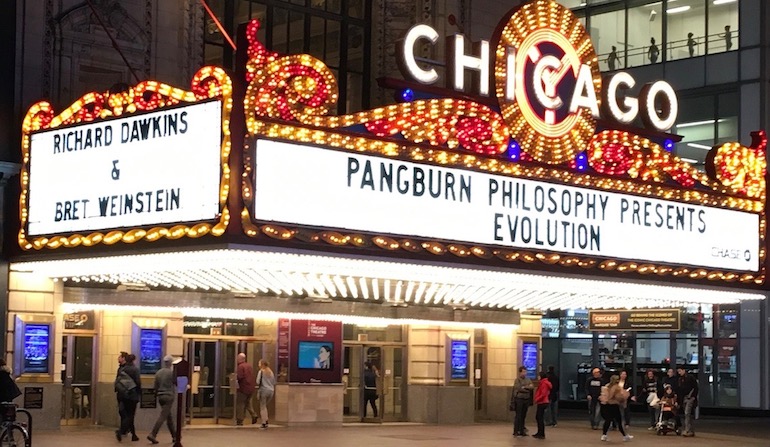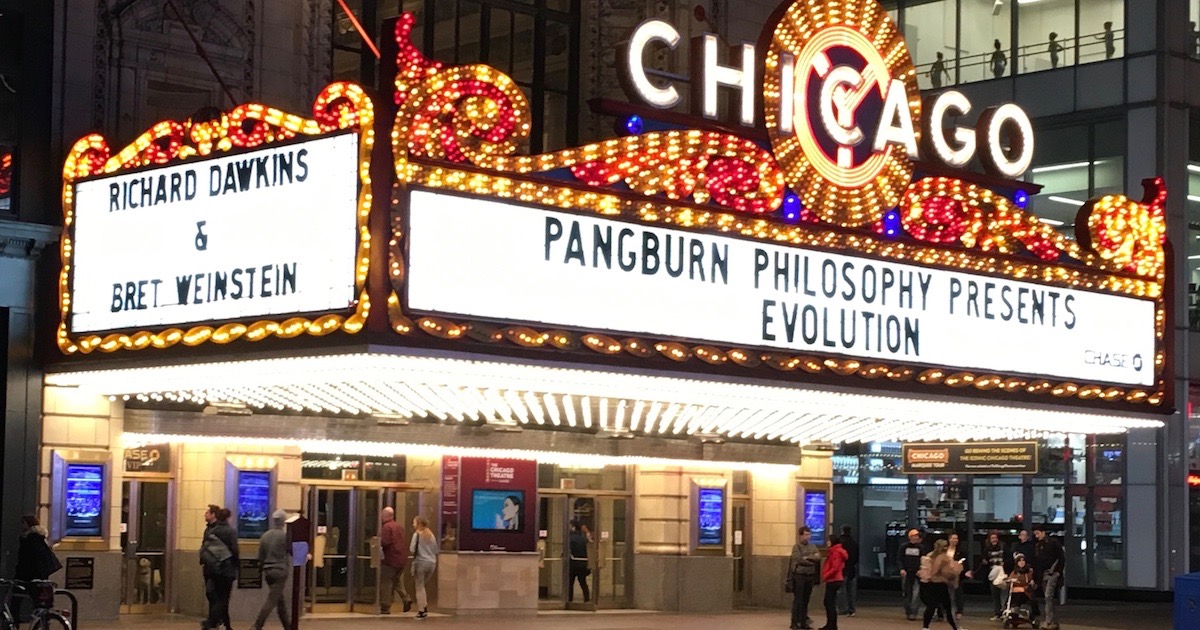 Evolution
Evolution
Richard Dawkins as Reluctant Darwinian


I witnessed something last week that I never thought I’d see. Richard Dawkins, pressed to affirm the explanatory power of Darwinian reasoning for human life, backed off, expressing great caution. In fact, he said that talking about human behavior in Darwinian terms was “not helpful” and “not Darwinian.” Pressing Dawkins was evolutionary biologist (and atheist) Bret Weinstein, who, as the evening progressed, out-Darwined Dawkins — if I may coin a neologism — on several fronts. Dawkins, come to discover, turns out to be a rather reluctant Darwinian, at least where human institutions such as religion are concerned.
The occasion was a conversation on Tuesday 23 October between Dawkins and Weinstein at the Chicago Theatre, sponsored by the promoter Travis Pangburn. By my rough estimate, about 1500 people attended, a few of whom showed themselves to be Dawkins devotees of an obnoxious sort. At one point, early on, a man sitting in the expensive seats near the front shouted at Weinstein, “Can Richard talk more, please?” (Weinstein had been carefully explaining a complicated biological point, apparently taxing the patience of this audience member, who wanted to hear from his Oxford guru.) Dawkins scolded the interrupter roundly, and as the conversation deepened, the entire audience later voted by applause to forgo the Q & A, to allow Dawkins and Weinstein to continue. Made me proud of my fellow Chicagoans: they wanted thoughtful discussion, not spectacle.
Weinstein in Command
Weinstein commanded the evening. Thrust into national prominence last year by the “Day of Absence” controversy at his former school, Evergreen State College, Weinstein has become known as a member of the “Intellectual Dark Web,” a hard-to-classify collection of rebels who manage to offend sensibilities right across the cultural spectrum. By prior agreement, Weinstein and Dawkins started their exchange by first stipulating where they agreed: for example, both affirmed that there is no evidence for supernatural causation in the physical universe. So (for both), insofar as Christianity makes any empirical claims, that religion is — as a factual matter — strictly false.
But then the discussants moved on to their areas of disagreement, which occupied most of the time. As Weinstein sketched out the boundary of controversy, with a series of propositions he knew Dawkins could not accept, it became clear that Dawkins was unwilling to extend the reach of natural selection to such matters as the persistence of organized religion.
Two Dawkins
Moreover, Weinstein argued that there were “two Dawkins,” at odds internally with each other. One Dawkins endowed natural selection with unparalleled explanatory power, but hesitated to extend that mode of explanation to historical realities such as human genocide (e.g., the Nazi era in Germany, or the 1994 Rwandan massacres), or religious behavior. In those spheres, the “other Dawkins,” as Weinstein put it, invoked cultural processes, and entities such as memes — but in an inconsistent or contradictory fashion, where memes floated free of their biological basis.
Why is it, Weinstein challenged Dawkins, that Roman Catholicism persists, and by standard Darwinian metrics (such as population growth), appears highly successful, when so many aspects of Catholic doctrine and practice look frankly crazy to both of us, and very costly to fitness?
“Well, Catholicism is a mind virus,” replied Dawkins — a meme replicating itself from brain to brain without regard to its truth or falsehood. But that is simply telling one’s Catholic interlocutor, answered Weinstein, that he or she is mentally ill, to which Dawkins said (eliciting much audience laughter), “But they are mentally ill.”
That won’t do, replied Weinstein. Why not say, instead, that Catholicism is what — in proper Darwinian terms — it appears to be, namely, an adaptation. If Darwinian principles are correct, Weinstein insisted, religions should not flourish globally, or even exist, unless they conferred some genuine selective advantage on their followers. Follow the logic.
Dawkins wouldn’t have it. His ongoing discomfort at Weinstein’s “religion is an adaptation” line of argument was palpable, perhaps because — I’ll speculate — it savored far too much of sociobiology, or evolutionary psychology, both of which risk strenuous condemnation in today’s cultural climate.
“The Values We Hold Dear”
But Weinstein does not care if he offends cultural officialdom, as his 2017 contrary-to-PC stance at Evergreen made plain. We need to know, he urged Dawkins, if we humans are hardwired with behavioral programs that, when triggered, might cause mass genocide. We need to know because only by “rebelling against our replicators” (i.e., inherited genetic programs) can we sustain “the values we hold dear.”
The values we hold dear? Like what? Fairness, kindness, mercy, objectivity, truth…oh, wait a minute, those are my values. Dawkins and Weinstein are borrowing them, but without anything resembling a sound Darwinian justification. Neither Dawkins, nor Weinstein, can give a thoroughly Darwinian account of what matters most to them, because (as their shared hero, the late evolutionary theoretician George Williams said bluntly), “Mother Nature is a wicked old witch,” and she doesn’t give a damn about our values, or whether you, or I, or anyone we love, lives or dies. A supernova that snuffed all life on this planet tomorrow would be just fine with Mother Nature, the icy-hearted bitch. Such things happen.
But that is a conversation for another time. The unstated admission price on Tuesday night was “Let’s play Darwin,” and I played along. When one leaves the Chicago Theatre, however, reality returns. (Thank God for that.)
Photo credit: Paul Nelson.
